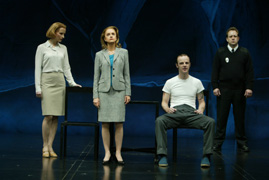
ROBERT HICKS
What’s missing in "Frozen?" *
How many plot gimmicks can one endure in "Prymate?" *
 |
| FROZEN -- Laila Robins, Swoosie Kurtz, Brían F. O’Byrne, Sam Kitchin. Photo by Joan Marcus. |
Circle in the Square Theatre, 1633 Broadway at 50th
Street
(Presented by MCC Theater)
Tues. 7:00 pm; Wed. 2:00, 8:00 pm; Thurs., Fri. 8:00 pm; Sat. 2:00, 8:00 pm;
Sun. 3:00 pm, $85.
Box office (212) 239-6200
English playwright Bryony Lavery’s "Frozen" starts out rather blandly, glimpsing briefly into the lives of its three main characters. One must pay close attention to their words and physical gestures, though, for they foreshadow what gradually builds in detailed layers in this searing, psychological drama about the mind of a pedophile and serial killer in England.
Three highly skilled actors play the leading roles. Brian F. O’Byrne is the central figure Ralph, a lower class bloke more attuned to the artistry of his tattoos than to the deep psychological pain that rages within him. Laila Robins portrays Agnetha, a neurotic American criminologist/psychiatrist out to prove her thesis "Serial Killing: A Forgivable Act?" by traveling to England where she dissects Ralph’s history of physical abuse. Swoosie Kutz underscores the role revenge plays in this drama as Nancy, the mother of one of Ralph’s victims.
The MCC Theater produced the U.S. premiere of the drama at a small, Off-Broadway space in March. Directed by Doug Hughes, the play recently transferred to Circle in the Square for its current Broadway run. The set is austere and the lighting minimal in an effort to focus on the slowly unfolding psychological drama of Ralph, Nancy and Agnetha.
Nancy’s 10-year-old daughter has disappeared on her way to take her mother’s shears to her grandmother’s house. Ten years later, her mother’s distraught face is frozen in the moment her daughter became another statistic in the growing problem of missing children in England. Throughout most of the play, Nancy abhors Ralph as a monster from whom she must exact Old Testament-style revenge for her daughter’s death.
By contrast, Agnetha seeks forgiveness for Ralph. She analyzes his criminal brain and his history of physical abuse as support for her thesis about the "differences between a crime of evil and a crime of illness," between "a sin and a symptom." She too, though, has her own secret heartbreak to bear and ultimately she fails in her efforts to get Ralph to feel remorse for his pedophilia and serial killings.
Ralph cannot understand Agnetha when she attempts to explain remorse and regret to him. He is frozen in his own self-denial. He finally says, "I only regret there’s no law to allow me to kill young girls." This chilling revelation allows the audience finally to see the monster in Ralph.
Meanwhile, Nancy blossoms in her self-importance through her new role as a motivational speaker for families of lost children. Her older daughter, though, convinces her to forgive Ralph. Ironically, Nancy’s visit to Ralph’s prison cell against Agnetha’s advice sets the stage for her revenge. She taps into Ralph’s memories of his father’s verbal abuse. To this point, Ralph has denied inflicting any hurt or pain on Nancy’s daughter. However, his ability to gain insight into his own pain allows him to identify with her hurt, so he can finally feel remorse and guilt. Here Lavery’s text gives insufficient foundation for Ralph’s ensuing psychological breakdown. It’s a bit incredulous that one conversation between Ralph and Nancy can suddenly transform his denial into self-understanding.
Ralph then sits in his prison cell, writing a letter to Nancy to convey his remorse and guilt. Blaring music distracts him though. Unable to concentrate, unable to articulate fully his feelings of remorse and guilt, he commits suicide by hanging himself in his prison cell. Again Lavery’s text provides inadequate basis for Ralph’s impulsive act and the audience is left with a hollow feeling as we witness Nancy and Agnetha in the anticlimactic final scene in which Agnetha reveals her secret heartbreak and Nancy feels guilt, yet embraces her revenge for her daughter’s death. They too are frozen, unable to move on in life.
How many plot gimmicks can one endure in "Prymate?"
 |
| James Naughton as Avrum and Heather Tom as Allison in Mark Medoff's Prymate on Broadway at the Longacre Theatre. Photo Credit: Paul Kolnik |
Longacre Theatre, 220 W. 48th Street
between Broadway and Eighth Ave.
Mon., Tues. 8;00 pm; Wed. 2;00, 8;00 pm; Thurs., Fri. 8:00 pm; Sat. 2:00,
8:00 pm, $25-$75.
Box office (212) 239-6200
Mark Medoff’s "Prymate" is an example of how political agenda and ideology can get in the way of good playwriting. His and his cast’s intentions are good, namely to address ethical issues about the use of animals in scientific research in our age of AIDS. However, bad acting from two of the actors, poor plot mechanism that reduces itself to gimmickry and unlively dialog prevents any effective communication of Medoff’s ideas on animal rights and on human’s responsibility to place limitations on individual freedom.
Prior to the play’s transfer from Florida State University in Tallahassee to the Longacre Theare, controversy arose over the casting of Andre De Shields, the Tony Award-winning black actor, as a gorilla whom Avrum (James Naughton), a research geneticist, injects with the AIDS virus to forward his efforts to win a Nobel Prize. Esther (Phyllis Frelich) creatively portrays a linguistic anthropologist who has trained Graham the gorilla in sign language for 23 years in New Mexico. Avrum’s signing assistant (Heather Tom) offers little more than translation of the sign language and conversation among the other three characters and she incredibly bites Avrum during sex later in the play after he is nearly drowned by Graham. Can anyone believe these plot twists?
All the humorous ballroom dancing practice and playfully quiet
understanding between Graham and Esther can’t rescue this misconceived drama
from all its ridiculous plot gimmicks. Even the most charged scene in which
Graham urinates on the signing assistant as a sexual gesture and in which
she masturbates him to orgasm only leads to yet another meaningless plot device.
After Graham attempts to drown Avrum, the signing assistant pulls the geneticist
from the water only to undress both him and herself so she can engage him
in sex and transmit her AIDS virus to him as revenge for his injecting Graham
with AIDS. Miraculously, there are now three of four characters on stage with
AIDS. None of Medoff’s plot devices are persuasive. As ineffective as his
ideas are, it’s even more unfathomable how this play ever got to Broadway.
Save your time and money and invest them in a seminar on medical ethics and
a trip to the Bronx Zoo. Or simply stay at home and watch Animal Planet and
CSPAN. [Hicks]

| museums | NYTW mail | recordings | coupons | classified |